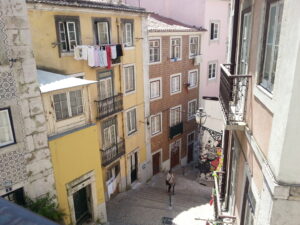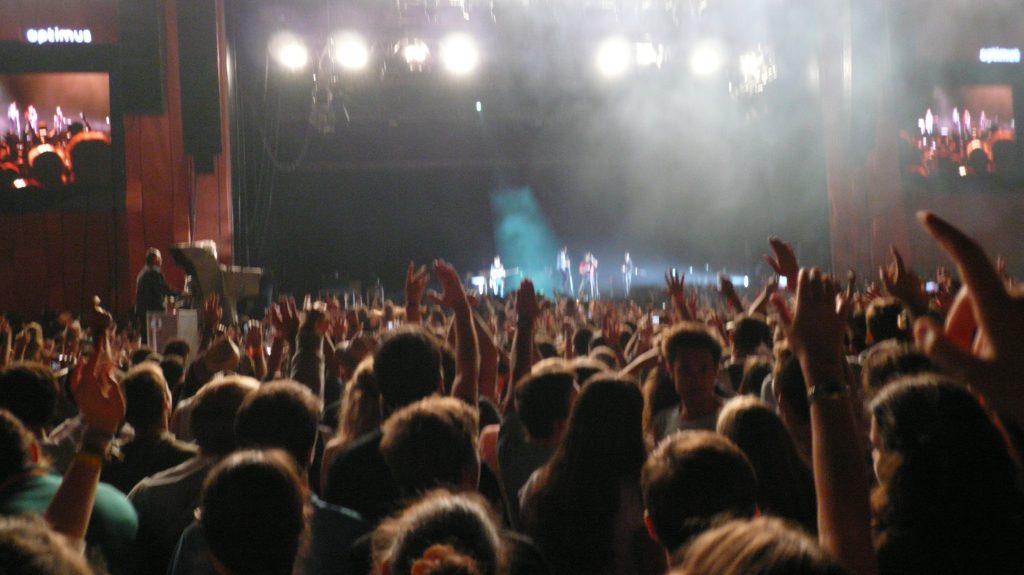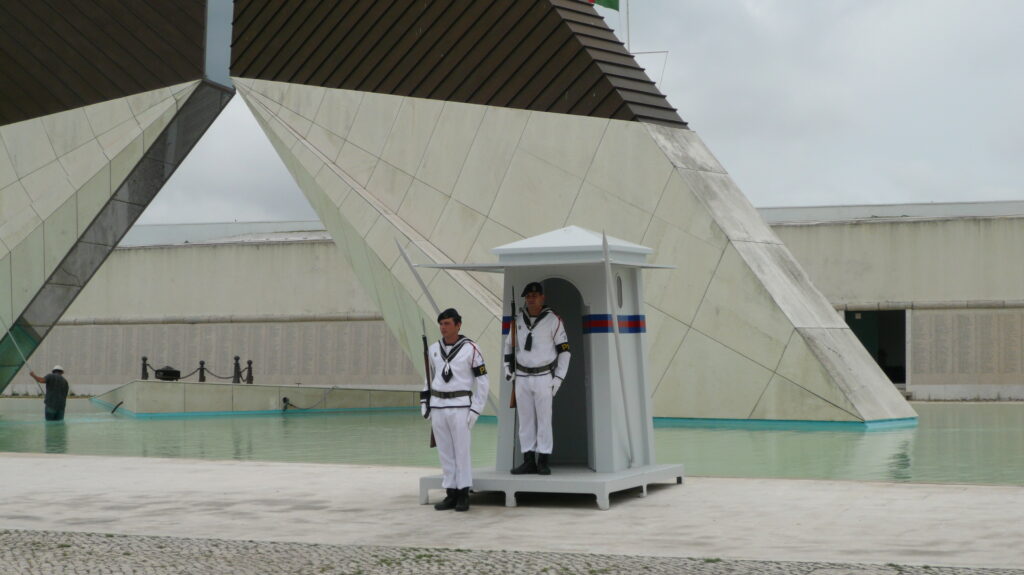We were very lucky to find accommodation in an AirBnB with Guida in her apartment in Lisbon. She lived just ten minutes walk from the Optimus Alive Music Festival venue but she provided us with much more than just beds for the night.
Before we got down to the business in hand and went to the festival we spent a day and a half exploring Lisbon thanks to Guida’s help and guidance.
Guida provided us with food for breakfast every day, she helped us to book our onward tickets to Lagos (because the website was in Portuguese), she took us on a quick guided tour of her neighbourhood and she got us cheap bus passes. She also printed out our tickets at her local library and even drove us to the bus station at 7.45am on her day off.
There was just one funny incident which was when she first showed us around and she asked us to make sure that we kept the bathroom door closed as her cat would get in. Guida was very vague about what the cat might do and I just assumed the cat would probably drink from the toilet – but we found out the next morning because I had accidentally left the door ajar in the middle of the night. I was first one up and in the bathroom and it turned out that the cat preferred to use the bidet rather than her litter tray. There, curled up in the bowl of the bidet was one very smelly, very large poo! Oops!!
Exploring Lisbon
On that first afternoon in Lisbon after a siesta we got a tram back into town and we walked up the steep hill to the Castelo de Sant Jorge. The views across the city from the ramparts were amazing although we arrived at the Tower of Ulysses just five minutes after they had closed off visitor access to the periscope. The camara obscura is an optical system of lenses and mirrors which had been invented by Leonardo da Vinci and I had actually seen one in action in Havana, Cuba. The castle is quite big with complete walls and seven towers to climb, and then as we wandered down the hill from the castle, we found a cute little rooftop bar with a sun terrace that overlooked the terracotta roof tiles of the city below.
We then wandered around tiny narrow streets in the Amalfa district on the hillside which consisted of steep steps and cobbles. Coloured garlands criss-crossed the washing lines that were strung between the balconies, children played in the gutters, and most of the houses were faced with painted ceramic tiles.
These tiles are common all over Lisbon and they lift common looking buildings into works of art. We then stumbled upon a ‘World Fair’ in a large square where we sat and drank caipirnhas from the Brazilian stall and listened to Latin American music whilst watching the Lisboans promenade past us in the park. That evening we ate in a tiny restaurant where I had the most delicate grilled sea bream that you could wish for and we also struck gold with our tram ride home when for the late night journey, the sleek modern tram had been replaced by one of the original bone-rattling wooden trams.
On Saturday morning we walked to the Belem area and visited the Torre de Belem (Tower of Belem), we wandered along the waterfront to the Padreo dos Descobrimentos (Monument to the Discoveries), we chatted with a Marine who was guarding the war memorial (more about him later), we poked our noses inside the Mosteiro dos Jeronimos (Jeronimos Monastery) and find of finds, had coffee and the most exquisite pasteis at the famous Cafe de Pasteis.
Guida had recommended that we shouldn’t miss this little treasure and we were so glad that we found it. Reminiscent of a tearoom in times gone by there were little ante rooms off from the main hall and we were served by waiters who glided silently around the rooms with their pretty tiled walls. As well as the opulent surroundings those pasteis were quite a little bit delicious and actually, as it turned out, quite famous.
The Optimus Live Music Festival
After a couple of very pleasant days sightseeing it was time to go to the festival.
I had never been to a music festival before, after having a bad experience involving a near riot with Dexys Midnight Runners (who remembers them?) when I was aged sixteen when they performed at the Top Rank night club in Cardiff. Since then I have always been wary around crowds and I had actively avoided concerts or gigs for most of my life. I wasn’t involved in the fracas in Cardiff but I had been just an innocent teenager who was caught up in the middle of a large mob who were out to cause trouble. Once some guys in the crowd turned violent and began throwing beer bottles at the band on stage, the police were called and it turned very quickly into something like the Wild West. I just wanted to escape from the cave like venue but I was trapped with all hell breaking out around me. The band left the stage and then when the police arrived the gangs turned on each other and a huge fist fight broke out.
Anyhow, I digress. This trip was all about finding myself and becoming confident so I decided to bite the bullet and go to a music festival – and after all, this destination was the winning ticket in my lottery to decide where to begin my travels so it was like fate was guiding me; which was how I ended up in Lisbon with tickets to the Optimus Alive Festival.
Queuing in the sun was relaxed with people from across Europe waiting in line. It was good fun trying to work out the language and the nationality of people but it was even more fun eavesdropping on people trying to chat each other up, with English as their second but common language.
Festival Highlights
I had never heard of the band Of Monsters and Men and because they didn’t have one of the headline slots and were performing in the ‘unknown’ tent I thought that it would be safe to get a place quite near the stage; however by the end of their set the tent was packed and people were standing outside right back to the food stalls. I think that their popularity took many people by surprise but the word soon went around that this wasn’t a band to be missed, and they continue to be a band that I listen to today.
Greenday were the headliners on the first day and as they had been one of my son’s favourite bands I knew most of their music. They gave a terrific live performance, as did The Kings of Leon – although with both bands I was careful to stay back, well away from the crazy mosh pit.
The Stereophonics also played as well as Biffy Clyro, Depeche Mode and the Brass Wires Orchestra and many others.
There wasn’t a huge choice of food but there were food trucks where we discovered a great Portuguese dish called ‘tachadinha porco’ which was spicy pork pieces served with onions, sauce and rather bizarrely tiny sticks of crisps in a bun. We also ate a lot of ‘farturas’ which are best described as giant churros which were served piping hot, rolled in cinnamon and sugar. For just one euro and eaten hot they provided the perfect energy rush.
To top everything off a LARGE tumbler of very decent red wine could be bought for just two euros. Maybe it’s not cool to drink wine at festivals but hey, when in Europe…! By the end of the festival I had hardly any anxiety – due in part to the relaxed atmosphere and the fact that so many people weren’t focusing on drinking but only wanted a good time in the sun with good music and their friends.
I didn’t see any trouble or anti-social behaviour as I would have expected but the majority of Spanish and Portuguese have a very different approach to alcohol compared to large number of Brits on an evening out.
I felt very pleased and proud of myself that I had faced my fears and I had been in large crowds for two days running but now it was time to say goodbye to Guida (although our paths would cross again) and time to take that bus south towards the Algarve where we were booked to do some volunteer work on an eco-farm and hostel.
A Portuguese Marine’s perspective on life.
Before the next article in which will tell you about our time in the Algarve I would like to tell you about our encounter with the Marine that I mentioned above.
It’s probably not a story that most people would bother including when they recount their holiday memories however I find people’s stories and opinions as interesting, if not more so that ticking off the top ten of places to visit.
In this instance, when we stopped to chat with Juan who was a guard at the war memorial we got a real insight into what a soldier thought of politics and customs.
It can do us all good to listen to another person’s view on one’s own country. All too often we can be quick to dismiss our heritage and we may grumble about our politicians and our way of life, or we might look the other way and assume that what we grew up with is superior to someone else’s experience in another part of the world. Sometimes it takes a foreigner to highlight what they believe to be bad in their country and to point out how your own might be so much better – but at the end of the day we don’t need to agree or to argue, but to keep an open mind and ask questions.
We had been walking along the seafront from Alges to Belem when we passed a large war memorial and we happened upon the changing of the guard. We stood to watch the ceremony and after the retiring guards had moved away, the sailor (I assumed) who was now ensconced in his guard box, beckoned me over and indicated that I should have my photo taken with him. I teased him that he would get into trouble as in the UK the guards were supposed to stand very still and be serious but keen to break the monotony of his day he proceeded to chat with us for the next twenty minutes.
Juan was trying to come to a decision. He had just about served his initial eight years in the Marines and was being pressured into signing up for a further term. He praised the British system and society for its forward thinking and appreciation of the role of its service personnel.
Like Britain, Portugal does not have compulsory national service, but unlike Britain it doesn’t allow its military personnel to sign up in chunks of time which may or may not be extended or opted out of (or at least it wasn’t an option when we met Juan.) Having served eight years he could now either leave or sign up and remain in the service until he was sixty five. He had enormous respect and pride for his country but he couldn’t begin to imagine how his politicians could consider an elite member of the forces would be able to continue until that age. He wanted to remain in the services, but not until he was that old, and he was therefore looking to terminate his career and return to university.
He was also full of praise for the British people and their support and pride in their troops. Juan explained that in Portugal the population generally considered people who went into the armed forces or the police to be civil servants and they refused to acknowledge their part in wars on the world stage such as in Afghanistan. He was so pleased to be able to thank me and BF for our pride in our armed forces (we are British therefore it was a given) and by proxy, our acknowledgment of his work.
Juan continued to highlight the differences between the decisions that the leaders of the two different countries had made when deciding to enter the European Union and choosing whether to adopt the Euro. He believed that both past and present British governments were fiercely protective of their rights, the currency and were strong and correct to stand up to the German Chancellor, whereas the Portuguese governments had given away too many rights and privileges in the past and now the population were paying for it. He was scathing about the German prime minister and her attitude towards the poorer nations in the EU and he could understand why so many young people wanted to leave his country and work abroad.
Politics aside, I am extremely proud of our armed forces in the UK and this was reinforced listening to Juan. We may have many things wrong in the UK but things are not always as rosy as they appear elsewhere and this was highlighted to me that day on the seafront in Lisbon.
If you have enjoyed reading this, please sign up (for free) over at my Buy me a Coffee page where you can see more of the articles like this one and you can read them in the order that they are published.






Lagos, Algarve? Another favourite place of mine. Don’t forget to find the historic slave trading building.
I am really enjoying reading your earliest adventures Jane. To think how you began and then how far you went. Looking forward to the next installment.